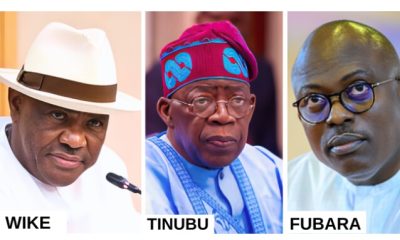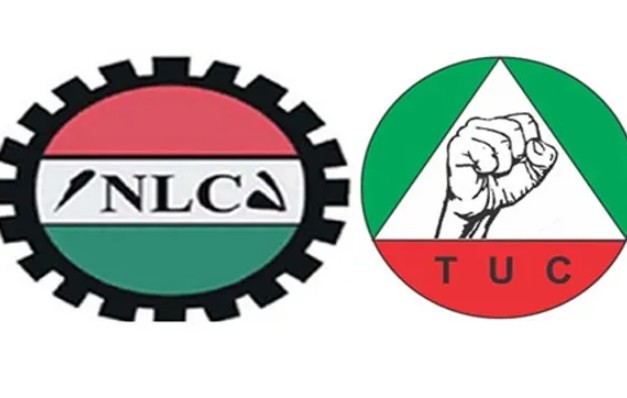News
Agreement with organised labour to cost Fed Govt N2tr

The Federal Government will spend not less than N2 trillion directly on the implementation of the Monday’s pact with the organised labour.
After a four-hour meeting, an agreement was reached to cushion the petrol subsidy removal pains on federal workers and other categories of Nigerians.
Highlights of the MoU signed by government and labour are as follows:
•Payment of a wage award of N35,000 monthly to federal workers for six months;
•Allocation of N100 billion for high-capacity Compressed Natural Gas (CNG) buses;
•55,000 CNG conversion kits and CNG stations nationwide; and
•N75,000 grant to 15 million households, payable in N25,000 monthly for three months.
Government will require N1.125 trillion to actualise the N75,000 grant to 15 million households for three months. The money will lift the living standard of some of the poorest Nigerians as well as pensioners.
The monthly wage award of N35,000 for about 1.5 million federal workers will cost the government N315 billion over a six-month period.
Besides, N100 billion will be committed to high-capacity CNG buses for deployment and use of commuters.
A review of the expenditure plan for 55,000 CNG conversion kits and construction of 84 units of CNG stations nationwide shows that about N400 billion will be invested.
The estimation is that government will construct two CNG stations per state and the FCT, with 10 additional stations spread across major economic centres.
Experts, social advocates and other stakeholders yesterday hailed the agreement and suspension of the strike, noting that the commitments to tangible palliatives will directly boost the economy.
They agreed that the suspension of the strike would save the economy huge losses. The strike was estimated to cost the economy not less than N50 billion per day.
The House of Representatives said the decision to suspend the strike was in the best interest of the country.
Deputy Speaker Benjamin Kalu said if organised Labour had embarked on strike, the economy would have been given a rude shock, adding that dialogue between the government and Labour yielded a positive result.
He also commended the Federal Government for budgeting N100 billion for the procurement of CNG powered buses and CNG kits to kick start the conversion.
Kalu expressed confidence in the ability of President Bola Ahmed Tinubu to engage the productive sector to drive the economic recovery process.
According to him, the third quarter micro-economic report showed that oil production moved from 1.2 million barrel per day to 1.45 million barrel per day.
He said though there was an improvement, more still needed to be done while there is need to work in synergy to optimise oil production.
The Nigeria Employers Consultative Association (NECA) said the country was able to avert unnecessary disruption.
Its Director-General, Mr Adewale-Smatt Oyerinde, said there is need for government to fulfill the terms of the resolution, urging the organised labour to also ensure improved productivity to get the wheel of production going.
“Employers will continue to insist on, and advocate a peaceful industrial environment as a pillar for economic and national renaissance,” Oyerinde said.
The NECA DG added that the effects of strike on the private sector were unimaginable.
He noted that private sector business was going through a lot to stay afloat.
“Anything that would compromise our ability to continue to pay salaries I think it should be taken into consideration.
“ Imagine a business that has borrowed from the banks in naira or dollars, when we go on strike, payment of interest does not go on strike, or payment of tax to government.
“Workers will also expect to be paid salaries during the period. Strike is not for us as it would further crippled businesses.
“It would also compound the businesses’ problems and also compound the realities of job security and salaries payment for the employees,” Oyerinde said.
No N35,000 wage award for 89,100 federal workers
For not being captured in the Integrated Payroll and Personnel Information System (IPPIS), 89,100 federal workers may not benefit from the N35,000 wage award proposed by the President Bola Tinubu administration.
Investigations by The Nation revealed that the government, in its determination to eliminate “ghost” workers from its payroll, is taking compliance with IPPIS very seriously
A source in the Presidency said since “the 89,100 federal workers are not captured under IPPIS, they cannot enjoy the largesse that will last for six months.”
According to him, since the government knows that 780,000 workers are captured on the IPPIS platform, it will not go ahead to fund what he called ”bad behaviour.”
The source also told The Nation that the Presidency was in possession of a letter from the Salaries and Wages Commission calling for a meeting to work out modalities for implementing workers’ salaries in the 2024 fiscal year.
The reply to the letter, he said, was being delayed because the key decision makers like the Minister of Finance and Coordinating Minister for the Economy, Wale Edun and other stakeholders have to be involved in the negotiations.
He, however, said the negotiation would be held before the end of this year in order to factor the outcomes in the 2024 Appropriation Bill.
President Tinubu on Sunday announced the provisional wage increase for all federal workers to minimise the impacts of petrol subsidy removal.
NLC to press for N200,000 minimum wage
The rising cost of living may push Labour to press for N100, 000 or N200, 000 minimum wage for its members, Nigeria Labour Congress (NLC) President, Joe Ajaero, hinted yesterday.
Labour centres – the NLC and the Trade Union Congress (TUC) shelved their planned strike Monday night, following a meeting with government authorities at the State House in Abuja.
Ajaero said the move was to give the government time to fulfill its part on the agreement reached with Labour, adding that the N35,000 wage award – part of the government’s offers – is not a new minimum wage which he said may be up to N200,000.
“So, it is not a minimum wage but it is a wage added to the minimum wage. So, should we in March, April, or before that time negotiate the new wage to be N100,000 or N200,000, it would be inscribed as minimum wage law which should be the law in existence,” the NLC president said on a national television yesterday.
Maintaining that the N35,000 wage award is not an addition to the country’s minimum wage of N30,000, Ajaero said many factors would be considered in arriving at a new minimum wage.
He said: “Certain things would come into play when we discuss it – inflation, cost of living. Every other thing would come into it.
“We would not go to ask for N65, 000. We would go for a realistic amount because N65, 000 is about $70 which is not up to minimum wage.”
According to him, for a new minimum wage to take effect, the National Assembly will play a crucial role.
“The minimum wage is a product of law. Until it is legislated in the National Assembly, it is not a minimum wage,” Ajaero said.
-

 Osun News1 day ago
Osun News1 day agoOsun Poly Staff Stabbed During Exam Supervision (Photo)
-

 Celebrities7 days ago
Celebrities7 days agoEx-Supper Eagles Player, Babangida Dies, Buried (Photo)
-

 Osun News2 days ago
Osun News2 days agoBank Manager Arrested By Police In Osun Over Alleged N650.8m Fraud
-

 Politics5 days ago
Politics5 days agoTinubu Reacts To Rivers Political Crisis, Sends Strong Message To Wike, Others
-

 Politics7 days ago
Politics7 days agoFamous Nollywood actress gets federal appointment (Photo)
-

 Education5 days ago
Education5 days agoVarsity Lecturer Stripped Naked Over Alleged S3xual Harassment
-

 Metro/Crime6 days ago
Metro/Crime6 days ago64 Suspected Internet Fraudsters Arrested In Osun
-

 Osun News3 days ago
Osun News3 days agoGov Adeleke Installed As Asiwaju Of Edeland




